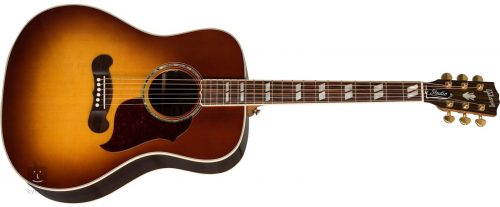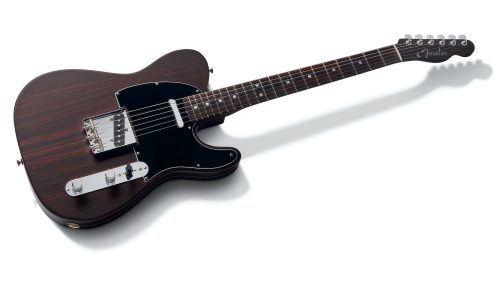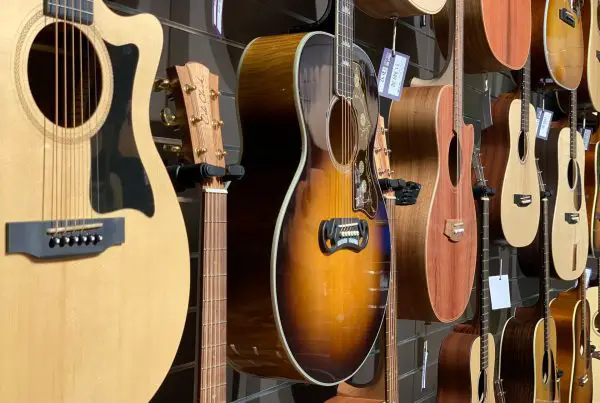The use of Rosewood in guitar manufacturing has been a topic of confusion and speculation. Some people think it is just a rumor, while others are unsure about the reasons behind the ban, its impact on guitar makers and players, and whether or not the ban has been lifted and if Rosewood is still illegal to trade.
Well, manufacturers have reduced the usage of rosewood to produce guitars because In 2017, the CITES (Convention on International Trade in Endangered Species of Wild Fauna and Flora) law was introduced, limiting the trading of Rosewood.
This made it difficult to obtain the wood as it required CITES certification. As a result, many guitar makers switched to alternative woods such as Ebony and Pau Ferro.
Rosewood is known for its great tonal qualities for guitar bodies, but its limited supply and decreased demand from businesses led to its decline in use. I was curious and did some research to find answers to these questions. In this post, I will share my findings with you.
Also Read:
- Is Rosewood A Good Tonewood? Uncovering The Pros & Cons!
- Guitar Body Showdown: Maple or Rosewood? (Sound, Weight, Cost)
Did Guitar Manufacturers Really Stop Using Rosewood?
Contrary to popular belief, rosewood was not completely discontinued by guitar makers. Instead, there was a partial reduction in its use.
Fender, in a statement after the CITES restriction, stated their commitment to continuing the use of Rosewood in their American-made solid body guitars, such as the American Professional Series.
They switched the majority of their Mexico-made products away from Rosewood and to Pau Ferro, a great alternative that they now use on the SRV signature strat. They thoroughly investigated alternative woods for selective use on a few US models.
Despite this, Fender emphasized that Rosewood will still be used because it is a historically perfect tonewood. They confirmed that it will be used in many of their instrument lines in the future. This means that they never fully stopped using Rosewood.
Why Did Guitar Manufacturers Stop Using Rosewood: The Story
In 2017, the trade of Rosewood became subject to CITES (Convention on International Trade in Endangered Species of Wild Fauna and Flora) regulations. This made it harder to obtain Rosewood as it needed a special certification to show where the wood came from. This made many guitar makers turn to alternative woods, like Ebony and Pau Ferro.
This made Rosewood guitars more expensive and harder to find. However, in 2019, the restrictions on Rosewood were lifted and it is now easier to get the wood for making guitars again.
Rosewood is important for the environment because it helps promote biodiversity and lowers the risk of flooding and water stress. When Rosewood is collected properly, it can improve people’s lives and is traditionally used for medical purposes.
Unfortunately, there have been many cases of illegal harvesting, smuggling, and corruption in the supply of Rosewood. African Rosewood has become the most trafficked type of Rosewood and this illegal activity has caused harm to the environment and local communities. The lack of proper laws and enforcement has allowed traders to take advantage of the situation.
Are Rosewood Guitars Still Banned (Illegal)?

Rosewood guitars are no longer illegal. The restriction on Rosewood was lifted on November 26th, 2019, except for Brazilian Rosewood which still needs a CITES certificate.
Owning, using, or selling Rosewood or items made from Rosewood was never illegal. The restriction was only for people in the wood industry, especially guitar makers, who needed to trade Rosewood internationally.
Before the restriction was lifted, you couldn’t move Rosewood across international borders without the proper paperwork. But now, Rosewood guitars can be traded or moved freely without any restrictions. Brazilian Rosewood is still limited, however.
Does Gibson Still Use Rosewood?

Gibson still manufactures Rosewood guitars indeed. However, the embargo did shake them a little, as it did other guitar manufacturers. However, it’s interesting to note that they have made a fantastic comeback.
The “J45 Studio Rosewood Acoustic-Electric Guitar Antique Natural,” “Gibson Songwriter Standard Rosewood Antique Natural,” and other models are some of their most recent developments with Rosewood.
Does Fender Still Use Rosewood?

Fender still uses rosewood as well. However, they alternate between Rosewood, Pau Ferro, and Ebony. Fender made these modifications when CITES placed limits on musical instruments made of Rosewood in 2017.
Since those prohibitions are no longer in effect, Fender has resumed using rosewood in the production of their guitars and has retained Pau Ferro and Ebony as alternative options for their whole lineup.
It was not only Fender in actuality. Many large manufacturers switched from employing Rosewood to other more sustainable woods that don’t require certification to trade across borders after the game-changing CITES legislation.
For instance, this had an impact on Fender models built in Mexico, as several of them had fretboards made of Rosewood but they moved to Pau Ferro, a comparable wood.
This was confirmed by the official statement issued by Fender, which stated that Rosewood would continue to be used in American-made solid-body guitars like those in our American Professional Series.
They claimed that after investigating other woods to Rosewood for use on a few US models on a selective basis, they have chosen to switch the majority of their Mexico-made products away from Rosewood to Pau Ferro, a great substitute that they now use on the SRV signature strat.
With their dealers and inventories, the American Elite series switched over to Ebony fretboards at that time. They also confirmed that Rosewood, a historically authentic tonewood, will continue to be used on several of their instrument models. So yes! Rosewood is still used by Fender as an alternative.
Conclusion
Laws like CITES have decreased the supply and order of Rosewood because it was becoming much more time-consuming and expensive to move the instrument globally due to the numerous permissions needed.
While it was in vogue, guitar manufacturers enjoyed it as a tonewood for their guitar brand especially acoustic ones, because it produces a warm, full-bodied sound with exceptional resonance, sustain, and loudness. Their warm, rich tone significantly improves a guitar’s overall tone.
With the ban lifted, guitar makers and guitarists are thankful but most especially, they genuinely hope that Rosewood beats its alternatives and changes its fortune in the world of musical instruments!





